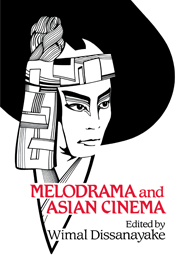Book contents
- Frontmatter
- Contents
- List of contributors
- Acknowledgments
- I Introduction
- II Melodrama / subjectivity / ideology: Western melodrama theories and their relevance to recent Chinese cinema
- III Symbolic representation and symbolic violence: Chinese family melodrama of the early 1980s
- IV The Goddess: Reflections on melodrama East and West
- V Melodrama as historical understanding: The making and unmaking of communist history
- VI Melodrama, postmodernism, and Japanese cinema
- VII Inscribing the subject: The melodramatization of gender in An Actor's Revenge
- VIII Insides and outsides: Cross-cultural criticism and Japanese film melodrama
- IX Psyches, ideologies, and melodrama: The United States and Japan
- X Negotiating the transition to capitalism: The case of Andaz
- XI The concepts of evil and social order in Indian melodrama: An evolving dialectic
- XII Politics of melodrama in Indonesian cinema
- XIII Power, pleasure, and desire: The female body in Filipino melodrama
- XIV The register of nightmare: Melodrama as it (dis)appears in Australian film
- XV Overview: What is American about film study in America?
- Index
IV - The Goddess: Reflections on melodrama East and West
Published online by Cambridge University Press: 05 June 2012
- Frontmatter
- Contents
- List of contributors
- Acknowledgments
- I Introduction
- II Melodrama / subjectivity / ideology: Western melodrama theories and their relevance to recent Chinese cinema
- III Symbolic representation and symbolic violence: Chinese family melodrama of the early 1980s
- IV The Goddess: Reflections on melodrama East and West
- V Melodrama as historical understanding: The making and unmaking of communist history
- VI Melodrama, postmodernism, and Japanese cinema
- VII Inscribing the subject: The melodramatization of gender in An Actor's Revenge
- VIII Insides and outsides: Cross-cultural criticism and Japanese film melodrama
- IX Psyches, ideologies, and melodrama: The United States and Japan
- X Negotiating the transition to capitalism: The case of Andaz
- XI The concepts of evil and social order in Indian melodrama: An evolving dialectic
- XII Politics of melodrama in Indonesian cinema
- XIII Power, pleasure, and desire: The female body in Filipino melodrama
- XIV The register of nightmare: Melodrama as it (dis)appears in Australian film
- XV Overview: What is American about film study in America?
- Index
Summary
No one has a perspicuous picture of the totality of Chinese cinema of the 1920s, 1930s, and 1940s. Many films have been lost, partly because little was done to preserve them after their commercial run, partly because China suffered so much physical destruction during many years of devastating war. After 1949, Chinese films were shown to scholars selectively: Films of a leftist tendency were privileged, others were less readily available. Even Paul Clark, researching his pioneering and invaluable study, viewed almost exclusively the work of “progressive” filmmakers and saw few of the more typical commercial productions of the pre-1949 period.
Students of the American cinema have gradually come to the realization that popular genres are serious, at least in their own terms. This realization has led to a kind of critical reassessment that has barely begun in the case of pre-1949 Chinese commercial cinema. The bulk of Chinese popular films remains neglected, and the films that have been studied have primarily been explicated in political and ideological terms, not subjected to criticism intended to address their achievement, and the implications of their achievement, as films. (India is another country whose popular cinema stands in fundamental need of critical reassessment.)
I realize that this chapter will do little to redress this neglect. The Goddess is not at all an “ordinary” or “typical” Shanghai product of the thirties.
- Type
- Chapter
- Information
- Melodrama and Asian Cinema , pp. 59 - 72Publisher: Cambridge University PressPrint publication year: 1993
- 3
- Cited by



